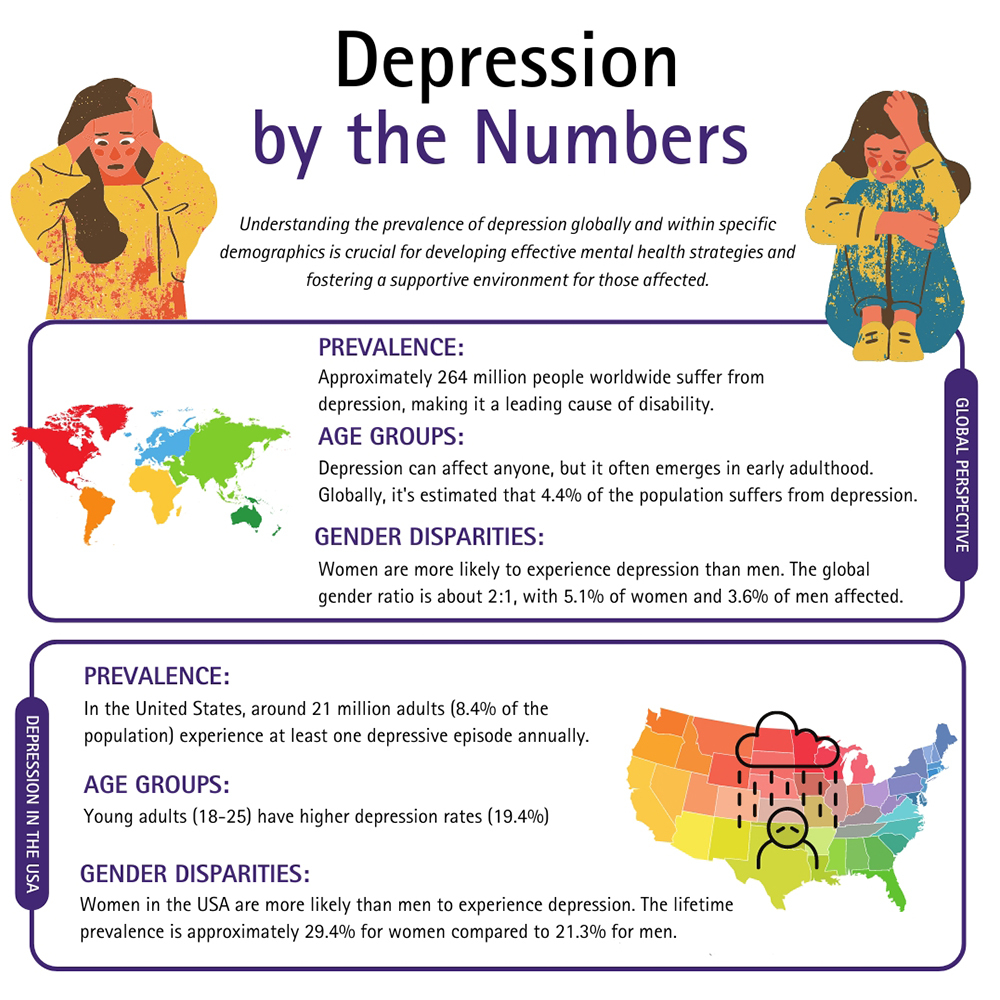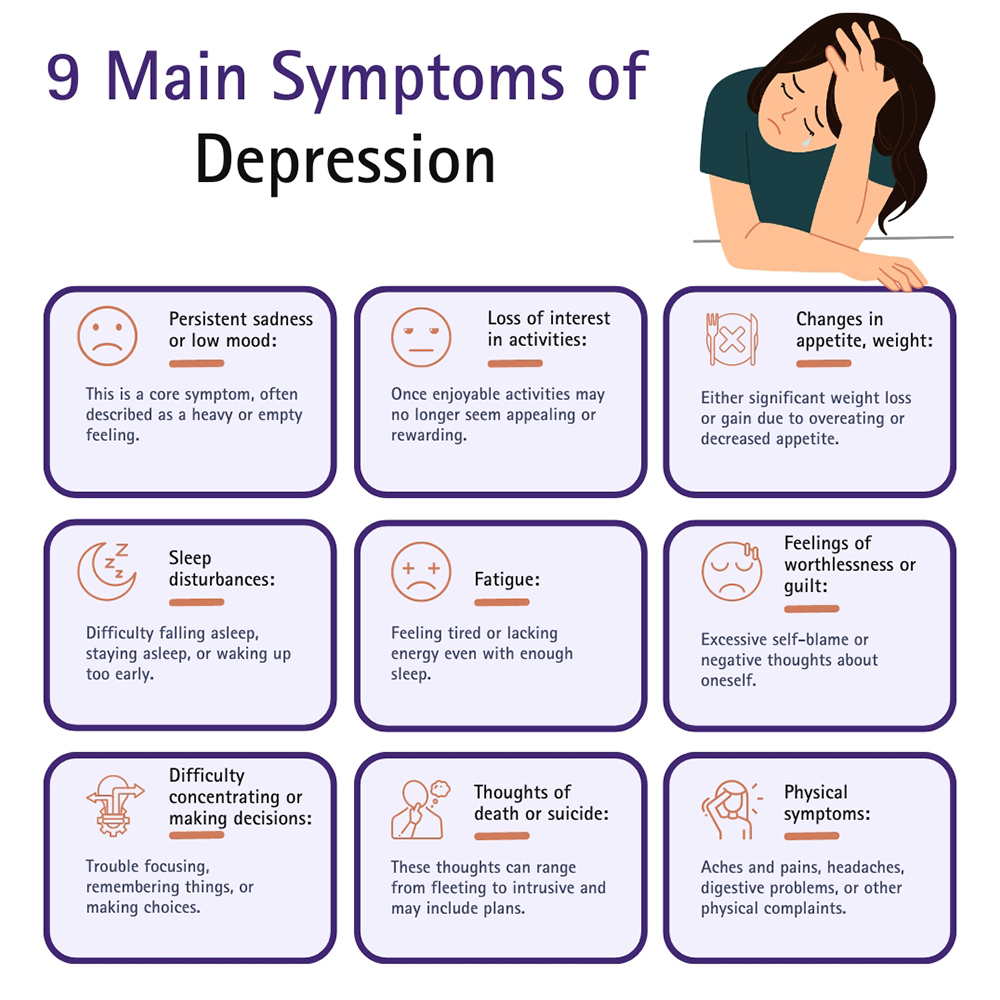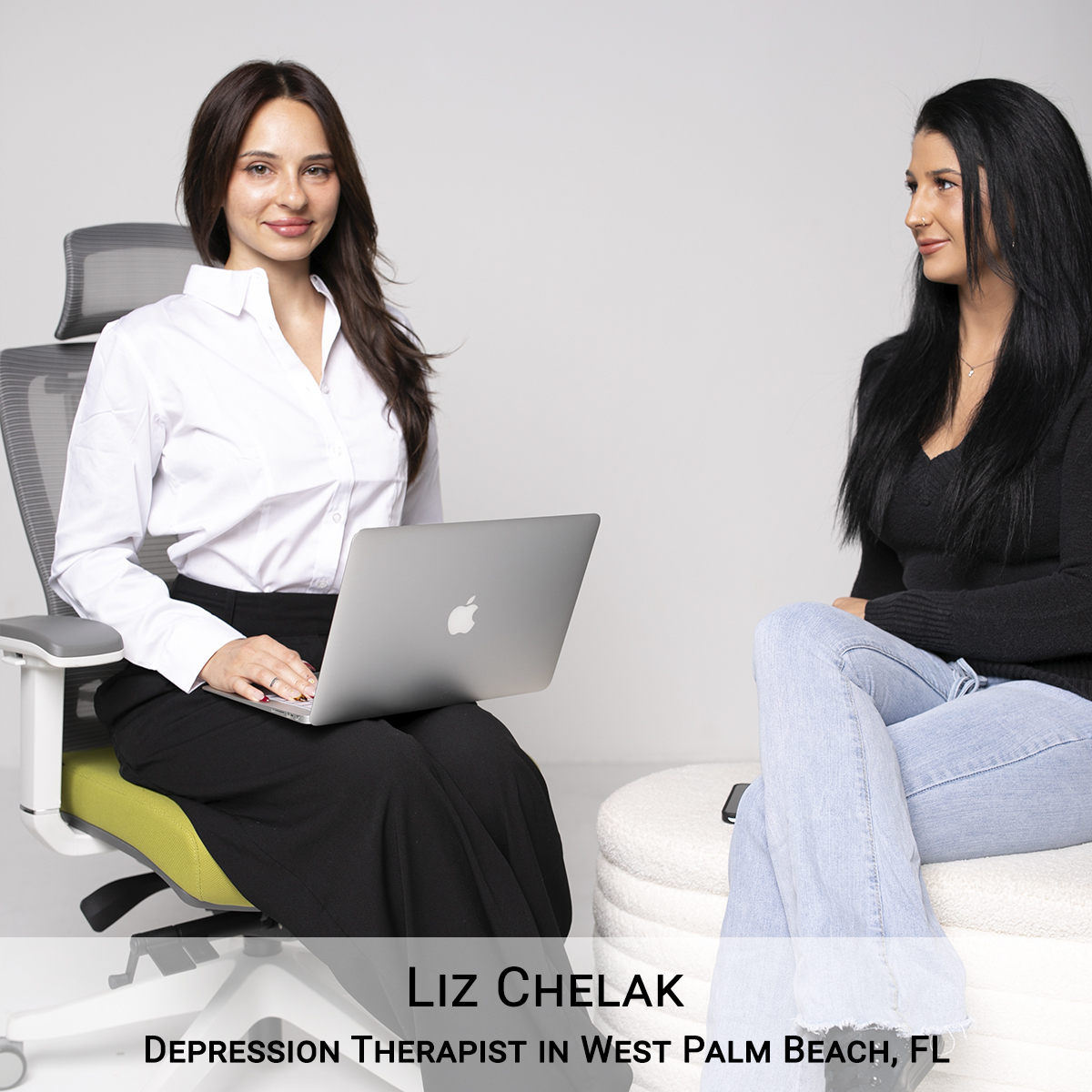What Is Depression?
Depression is a mental health disorder characterized by feelings of sadness, low energy, and decreased interest in activities you used to enjoy. Depression is more than being sad. It’s an inability to do daily tasks, to get out of bed and brush your teeth, to feel excitement, all while feeling intense guilt for it.
Symptoms of depression include:
- Depressed mood most of the day, every day for 2 weeks
- Diminished interest in all activities
- Weight loss or gain
- Insomnia or hypersomnia
- Physical hyperactivity or retardation
- Loss of energy
- Feelings of worthlessness or guilt
- Decreased ability to concentrate or indecisiveness
- Thoughts of death
There are different levels of severity of depression. Depression is a real medical condition, not a moral failing. However, there is treatment. Your therapist at the Trauma Therapy Center will guide and support you on your path to freedom from depression and satisfaction from life.

What Are the Types of Depression?

There are different types of depression, including:
- Major depressive disorder (MDD): MDD is what is known as clinical depression. It is characterized by persistent feelings of sadness, emptiness, and hopelessness. Symptoms typically last for at least two weeks.
- Dysthymia: Dysthymia is considered to be a milder form of MDD. Symptoms are still chronic and persistent but less severe.
- Seasonal affective disorder (SAD): SAD is a type of seasonal depression that occurs at a specific time of year, usually in the winter or fall. It is believed that this form of depression is associated with changes in light exposure.
- Postpartum depression (PPD): PPD happens to women after childbirth. PDD symptoms include sadness, feelings of emptiness, and exhaustion. PPD typically lasts from several weeks to months.
- Premenstrual dysphoric disorder (PMDD): PMDD is a type of premenstrual syndrome (PMS) characterized by intense mood swings and sadness, irritability, along with physical symptoms.
There are other forms of depression, however, these are the most common. If you think you may be experiencing any of types of depression talk to your counselor about treatment options.
Who Does Depression Affect?
Depression can affect people of all ages, genders, races, and backgrounds. Depression does not discriminate and it can happen to anyone.
Some risk factors for depression include:
- Physical, emotional, and sexual abuse
- Family history of depression
- Chronic stress
- Health conditions
- Substance use
- Social isolation
- Low self-esteem or perfectionism
- Major life changes
While these factors can contribute to the likelihood of developing depression, someone without these risk factors can still feel depressed. It’s important to remember that there is treatment and you can feel satisfied with life again through trauma therapy.
I’ve had nothing but wonderful experiences with Trauma Therapy Center WPB. Liz is very caring and helpful and communicates in a way that feels natural with me.
Liz Chelak is so kind and ready to help. I felt very taken care of and welcomed as I was seeking therapy. She is very professional!
Great practice with so much knowledge and support to offer. Would recommend to anyone.
How Common Is Depression?
According to the World Health Organization (WHO), depression affects over 200 million people around the world. According to the National Institute of Mental Health (NIMH) 7.8% of adults in the U.S. experience at least one depressive episode per year.
How Is Depression Diagnosed?
Depression can be diagnosed by a therapist, counselor, psychologist, or psychiatrist.
A mental health professional can diagnose depression with a combination of the following:
- Assessment: Using tools like questionnaires, your therapist will guide you through some questions that will help you understand your symptoms and diagnosis.
- Interview: Your therapist may ask you questions about your history, major life events, and your current experiences.
- Diagnostic and Statistical Manual (DSM-5): This tool can help you learn the symptoms of depression and identify which ones you relate to. It can also help your therapist properly diagnose you.
- Medical evaluation: At times, mental health issues can be caused by medical reasons. It is important to rule out medical causes, so your therapist may refer you to a doctor.
Your counselor can diagnose you with the correct form of depression and guide you through the best treatment for you.

How Is Depression Treated?
Liz Chelak, LCSW, CCTSI, CRPS shares her favorite way to help her clients overcome depression is with Rational Emotive Behavioral Therapy (REBT). REBT is a tool that can help you change your perspective.
In my professional experience, most of our challenges don’t come from the things that happen to us, but rather how we respond to them. REBT helps you identify your irrational beliefs and learn ways to dispute them. Learning to challenge and change your beliefs can be a vital part of healing from depression.
Embrace Healing The Power of Trust in Therapeutic Relationships
“In my experience, the most effective aspect of therapy is the therapeutic relationship. Establishing trust between a client and clinician is the first step to healing.”
Can I Prevent Depression?
It may not be possible to prevent depression completely, but there are several things you can do to promote positive mental health:
- Maintain a healthy lifestyle: This includes nutrition, sleep, and physical movement. Taking care of your physical health positively impacts your mental health.
- Develop coping skills: You can choose any healthy coping skills you like to help combat symptoms of depression. These can be walking, reading, stretching, listening to music, drawing, writing, or anything you enjoy. Your therapist will teach you additional coping skills like grounding and somatic regulation.
- Seek social support: As social creatures, we cannot be fully satisfied with life in isolation. Having someone you trust to talk to can greatly improve your mental health.
- Hobbies: Participating in hobbies simply for the enjoyment of them can improve our mental well-being.
- Get help from a therapist: Sometimes it’s hard to know how to combat depression on your own. A therapist can provide you with the tools you need to be able to work on your mental health while supporting you and keeping you accountable throughout the process.
There are many ways to help prevent depressive symptoms. Your therapist can support you in finding the tools that work for you.
What Is the Prognosis of Depression?
The prognosis for depression depends on several factors such as:
- Severity of depression
- Medical issues
- Current environment
- Support system
- Participation in treatment
It’s important to note that depression is treatable. Treatment typically involves psychotherapy, medication, or a combination of both. You can completely recover from depression, find freedom, and create the life you desire.
How Does Therapy Help in the Treatment of Depression?
 Therapy, especially evidence-based interventions such as cognitive behavioral therapy (CBT) and rational emotive behavioral therapy (REBT) can help you with depression in the following ways:
Therapy, especially evidence-based interventions such as cognitive behavioral therapy (CBT) and rational emotive behavioral therapy (REBT) can help you with depression in the following ways:
- Identifying negative beliefs: Negative thought patterns are typical of depression. It is difficult to know how to challenge these, sometimes deeply rooted, beliefs on your own. A therapist can help you learn skills to identify your negative thoughts and reframe them.
- Learn coping skills: A therapist can help you identify coping skills that work best for you. Challanges occur in life. Healthy ways to deal with stressful situations can improve your mental well-being and life.
- Changing behaviors: Behavior modification therapy can help you acquire positive consequences from new behavior patterns.
- Increased awareness: Awareness is always the first step of change. Through therapy, we increase awareness of your feelings, thoughts, and behaviors. After that, you can identify which are not serving you and how you can change them.
It is often difficult to handle depressive symptoms on your own due to the fatigue and loss of interest associated with depression. With the help of a trusted counselor, you can begin to step out of depression and into fulfillment from life.
For more information about our counselors or to schedule an appointment with a depression therapist, call the therapy center.
(561) 363-7994How Many Therapy Sessions Do I Need for Depression?
The length of therapy depends on you and your therapist, the severity of your symptoms, and your willingness to change. Typically, Liz Chelak, LCSW, CCTSI, CRPS recommends a minimum of 12 sessions.
I believe there is always more to learn about yourself, life, and tools to improve your happiness and satisfaction with life. As a therapist, I am willing to work with you as long as you are willing to participate in your therapy. As a qualified therapist, I am able to update you on your progress, recommend things to work on and provide adequate support throughout your progress.
What Is TMS Therapy for Depression?
Transcranial magnetic stimulation (TMS) is an innovative, non-invasive, and well-tolerated method for the treatment of depression. The technology TSM is based on, electromagnetic mutual induction, was first discovered in 1831; and in 1985 the first TMS device was invented. TMS is typically used when other forms of depression treatment have been ineffective.
TSM uses electromagnetic pulses over the scalp to affect the cortical activity of the brain. The magnetic fields affect mood regulation by delivering small electrical currents to help stimulate nerve cells and improve brain activity. TMS sessions are 20 to 40 minutes long over several weeks. TMS has mild side effects that include scalp discomfort and headache.
How Much Does Depression Therapy Cost?
The cost of depression therapy depends on several factors such as the qualifications of the therapist, the location of the office, and whether you are using your insurance or paying cash. Typically the cost of each therapy session ranges from $200 to $300. Some therapists also provide a sliding scale fee schedule based on your salary.
At the Trauma Therapy Center, we acknowledge that therapy costs may be challenging for some individuals and we want to make sure therapy is accessible. Please ask about our sliding scale payment options.
Explore our therapy cost page to find the right session format for you.
What Is Outpatient Therapy for Depression?
Outpatient therapy for depression involves the client coming into the office sessions or attending sessions virtually regularly. The client lives at home, as opposed to inpatient therapy in which the client lives in a residential facility.
What Therapy Is Best for Depression?
The type of therapy that is the best for depression depends on your individual needs, your preferences, your therapist’s specialty, and the severity of your symptoms.
Some evidence-based treatments for depression include:
- Cognitive behavioral therapy (CBT): CBT helps you develop coping skills, identify negative thoughts, and provide you with tools to reframe your thinking.
- Psychodynamic therapy: This type of therapy involves unconscious thoughts that can impact your day-to-day life. It aims to improve awareness of your subconscious mind and its effects on your feelings behavior.
- Rational emotive behavioral therapy (REBT): REBT aims to help identify your irrational beliefs and learn techniques to dispute them.
Any of these types of therapies are effective for helping clients overcome depressive symptoms. The type of therapy you choose will only affect the road you take. However, it is important to choose one with the help of your therapist to achieve lasting peace and confidence.
If you are struggling with depression, please know that you are not alone. Help is available, and you don’t have to go through this alone. Please reach out to a therapist or counselor today. You can also find more information about depression therapy in West Palm Beach by contacting our office.

